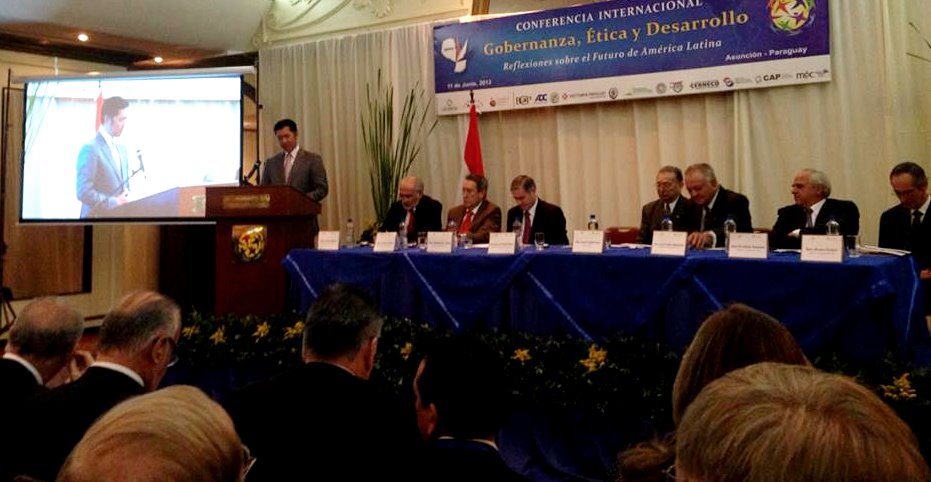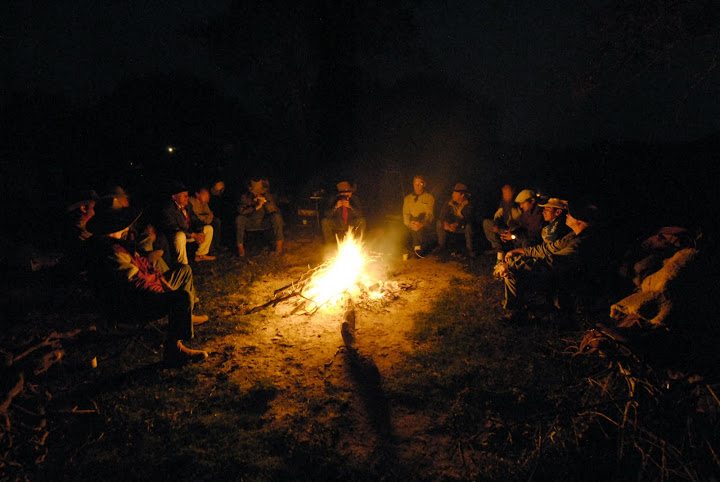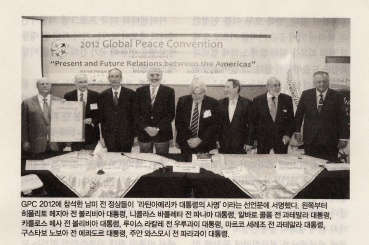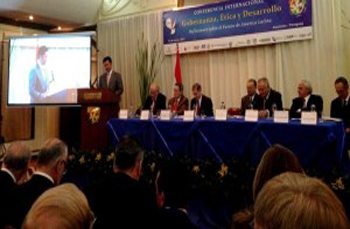Tuesday, June 11, 2013| Asunción- Paraguay

Dr. Moon calls on political, business, media and civil society leaders to spark a hemispheric movement for peace.
Esteemed former presidents, dignitaries and ladies and gentlemen, it is my distinct honor to greet you in this beautiful land of Paraguay—a nation which holds a special place in my heart—and to share a few words with this prominent gathering of national and international political, social, religious and business leaders.
It would take too long to mention each of you by name, but I would like to give special recognition to the former presidents who took the time out of their busy schedules to be with us today as special representatives of this distinguished and august group of leaders:
Let us express our appreciation to Presidents Juan Carlos Wasmosy of Paraguay, Vinicio Cerezo and Alvaro Colom of Guatemala, Ernesto Samper of Colombia, and Carlos Mesa of Bolivia for joining us here today.
Paraguay’s Time to Shine
Since my last visit here a year ago, “much water has flowed under the bridge,” as the popular Spanish saying goes. Despite serious difficulties, the interim government held general elections for a new president and administration on April 21st, which was acknowledged by numerous international observers as a fully legitimate and properly conducted election. This is a time for Paraguay to shine.
Today, there is a duly elected government that will soon come into office, peacefully and with unquestioned legitimacy. I see this as a great moral and political victory for the people of Paraguay, clear evidence that true republican ideals and the first principles of a well-functioning democracy can take hold in this region.
Now, however, Paraguayans must look ahead and build upon their achievements by developing a proactive road map to unleash intrinsic social and economic opportunities. Paraguay has always had great potential, yet, was unable to harness that potential due to the political challenges it has faced in the early years. But, with the precedent of the recent elections, it stands on a new footing of legitimacy that is gaining recognition from the international community. I believe this is a time for Paraguay to shine.
Differing Heritages of North and South America
Today’s conference on “Governance, Ethics and Development” is of great and timely significance for Paraguay, this region and the entire hemisphere. As we in the West know, the American hemisphere’s unique contribution to modern global history would not have been possible without the paradigm shifts in worldviews brought forth by the Renaissance and Reformation in Europe.
Many who made the long voyage across the Atlantic came with hopes of a new beginning filled with opportunities in this new land. Yet, over the course of several centuries, the stories of North America and South America and Latin America unfolded very differently with real qualitative and quantitative consequences for their people, although they were all of primarily Christian and European descent.
The fundamental difference lay in their heritage. North America was shaped by the British legacy, which paved the way for the first constitutional government, and the recognition of “fundamental rights” of all Englishmen.
On the other hand, the Central and Southern regions of the Americas were largely influenced by the more feudal political-religious traditions of the Iberian Peninsula that remained a bastion and champion of old Europe.
Thus, the impulses for fundamental reform and changes that the Renaissance and Reformation brought to Great Britain did not materialize in Spain and Portugal.
Naturally, this had a great impact on the relative developments and history of the aforementioned regions and their respective national revolutions for independence from their European progenitors.
Therefore, although the South American revolutions in the 19th century strove to establish regional political blocs similar to that in North America, they were unable to do so.
Latin America fragmented into many independent autonomous nation states that were still heavily influenced by the old systems and traditions of the Iberian Peninsula.
Even today, Latin America struggles with this legacy, since relatively small elites control the political, social, religious and economic lives of their nations, thus creating the circumstances of discontent in which radical ideals such as communism and liberation theology have emerged and taken root. Whereas many developing democracies around the world have dealt with the inequities of feudal societies, Latin America still faces that challenge.
That is why I am so excited about the transformations taking place here in Paraguay.
The “Womb” of Latin America’s Rebirth
Ever since I first visited this nation, I have always believed that Paraguay, given its geographic centrality as well as its unique historic and cultural roots, could and would be the metaphoric “womb” of a rebirth of Latin America.
Its history reflects the heart of a peace-loving, inclusive people who, unlike other nations in the Americas, embraced the native population, even adopting their language of “Guarani” as part of the national heritage. But of all and most importantly, Paraguayans have always recognized and honored God in their families, communities, and in the life of their nation.
It was for this reason that I held the first Global Peace Festival here in Paraguay in 2008 during a period of immense internal political strife for this country.
I emphasized the importance of moral and innovative leadership and the need to set the proper precedents for this young republic to continue on a path toward the fulfillment of its great potential.

Dr. Moon and fellow cowboys sit around the fire during a cattle drive in 2008 across the Chaco region of Paraguay.
I still remember the one and a half hour debate I had with then President Nicanor Duarte on the importance of vision, principles and values and the need to set the proper legacy of a peaceful democratic transition in order for this fragile democracy to survive.
I also recall my speech at the National Congress where I once again I emphasized the points I made to the president as well as challenged the Congress to build a new country centered upon universal spiritual principles and values, and the vision of “One Family under God.”
My fondest memories come from my direct experiences with the Paraguayan people. I am told that the cattle drive I conducted with a group of young Paraguayan elites through the Chaco that same year is still talked about today.
I remember well the fireside talks I had with those young men as we camped each night on our journey through Alto Paraguay amid some of the poorest towns and indigenous communities.
I also vividly recall the transformation in them as we rode into the town of Maria Auxilidora and had the privilege to be offered a humble, yet delicious meal by its inhabitants. Many of those young men had never had such an experience, and I witnessed the social divide that had separated the rich and poor of this nation for centuries disintegrate in the face of our common humanity.
There, I saw the greatness of the Paraguayan people and the bright future for this nation if it was encouraged to dream big, to think big and to act big.
Upon my return to Asuncion after the cattle drive, I had the opportunity to speak to 30,000 young people at the first Global Peace Festival in Olympia Stadium.
There, I challenged them to dream the greatest dream of all and to build “One Family under God” and to take ownership for the future destiny of their nation. To my delight, the response was overwhelming.
I specifically recall the immense excitement, energy and sense of hope that shaped that evening events. The whole nation was being energized to take charge of its destiny and its effects were palpable.
GPF in Paraguay
In 2009, we launched the Global Peace Foundation (GPF) in Paraguay. Since then, GPF has been advancing character education programs in schools throughout the country in cooperation with the Ministry of Education.
We organize youth volunteers to do social service work such as plant trees, clean parks, and paint schools. In addition, we are promoting the advancement of women through our annual “Living for the Sake of Others” award as well as other programs which allow women to contribute directly to their communities.
In the town of Puerto Casado, GPF has worked unceasingly to provide relief to the townspeople in the form of medical and dental care, educational programs, donations of food, clothing, blankets, school and sports equipment and so much more.
Shortly thereafter, we established the Association for the Development of the Chaco, which has set up a communal vegetable farm, a major fish farm, and a bakery, providing jobs on a rotational basis to hundreds of people in Alto Paraguay and helping to improve their diet. All these efforts were to create a stable way of life for the people of Alto Paraguay, that they could take pride in and responsibility for.
Next, in 2010, recognizing the need for a think-tank which could help to make a road-map for Paraguay’s future development, I encouraged the founding of the “Institute for the Development of Thought: Patria Sonada (IDPPS) under the able leadership of the Honorable Dr. Jose Altamirano.
The Presidential Mission is committed to strengthening relations between the North, Central and South America and the Caribbean as well as promoting a hemispheric spiritual awakening centered on universal principles and values.The Institute has achieved a great deal in a short time, especially through its work on a development model for the vast, poverty-stricken Chaco region based on mobilizing public and private partnerships.
In addition, besides a number of local conferences, seminars and workshops, IDPPS has successfully carried out or partnered in three major Global Peace Leadership Conferences – in Asuncion in 2010, in Brasilia in 2011, and in Atlanta, in 2012. Each of these conferences also had the invaluable support of the Esquipulas Foundation of Guatemala, led by our illustrious former President Vinicio Cerezo, and the National Leadership Conference of Uruguay.
The Latin American Presidential Mission
At the Global Peace Convention in Atlanta last year, GPF, in alliance with these three prestigious institutions, launched the Latin American Presidential Mission, comprised of nearly, I wrote 20, but I guess it’s 19 former Heads of State.

The Atlanta Declaration 2012 launched the Latin American Presidential Mission to promote hemispheric cooperation with North and South America under the names of 19 former heads of state.
The Presidential Mission is committed to strengthening relations between the North, Central and South America and the Caribbean as well as promoting a hemispheric spiritual awakening centered on universal principles and values.
Another focus areas of the Latin American Presidential Mission is trade and investment, and on this trip I have brought with me a group of Korean investors to see firsthand the enormous opportunities that are now opening up for this country and region.
Could you please rise, our Korean business group. Please, give them a round of applause.
That’s not all, we also brought along because the story of Paraguay needs to be brought around the world. So that they can report about the transformations that are happening in this region of the world, so distant from Asia, yet so close in terms of their experiences. Could we also have the journalists from the Korean media stand up.
Finally, the most important area of focus for the Latin American Presidential Mission is in the area of education, given the enormous untapped potential of Latin American youth.
A huge part of that task involves a broad form of educational initiatives targeting moral and civic development as much as practical skills and knowledge.
With proper education that emphasizes vision, principles and moral values, a new generation of leaders will set a new paradigm of leadership far removed from the continent’s feudal systems and traditions and its subsequent problems with corruption.
As President Carlos Antonio Lopez, the first president of Paraguay, said, “Schools are the best monuments that we can offer to freedom.” In other words, education should be fundamental and total, transforming the cultural and historic underpinnings of the region’s challenges and providing equal opportunity for all.
I’m sure that if Paraguay manifests this kind of ethical and moral revival, the construction of a new Republic that gives legal certainty, opportunity and security to all its citizens as well as foreign investors will lead to a tremendous blessing of peace and prosperity for this nation.
Entrepreneurs will pour in to invest long term, and the doors will open wide to improvements in infrastructure, better ways of production, new emerging industries and expanded uses of Paraguay’s abundant and diverse energy resources and reserves.
All of this in turn will allow this landlocked country to reach out beyond its borders and connect to the larger world, not only its close neighbors within the MERCOSUR alliance, but also, looking towards the Pacific to the alliance recently formed by Chile, Peru, Colombia and Mexico, and beyond, to countries as far away as Korea and the rest of East Asia.
A Spiritual Movement in Paraguay and the Americas
What I have shared with you today comes straight from my heart.
I love this country and wish to see it prosper. I hope you will think big and never give up your dreams.
You have overcome many obstacles throughout your history, including devastating wars in the 19th and 20th centuries.
Many used to think that Paraguay was the “basket-case” of Latin America.
They even believed that this nation would revert to totalitarianism due to recent political challenges. Yet, here you are. You have overcome great adversity and are still standing tall, poised to grasp the future with all the hunger and hope of an undying champion.
In conclusion, let me say that the vision of “One Family under God” can inspire and motivate a spiritual movement of renewal here in Paraguay and throughout the Americas.
My hope is that this conference will serve as a catalyst to spark that movement to life. I challenge each and every one of you, especially our esteemed presidents with us here today, to take up the mantle of moral and innovative leadership and to build a legacy of the highest ideals, for our communities, nations, and the entire human family.
I urge you all to join with me in this great endeavor, and work in you respective fields to secure that bright future for Paraguay, and all of your countries in Latin America, throughout the region and this hemisphere.
Thank you very much for your commitment and may God bless each of you and your families.

